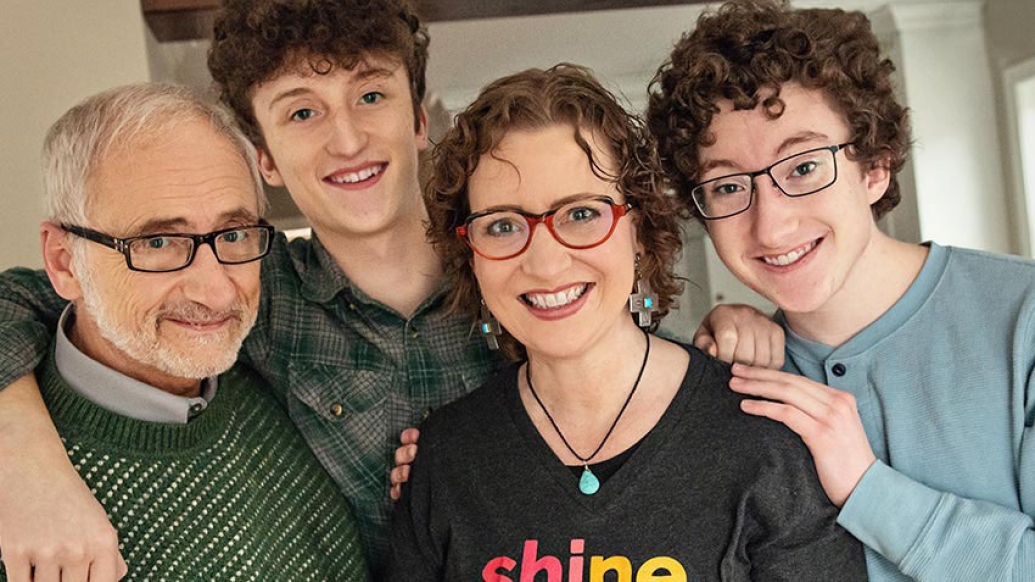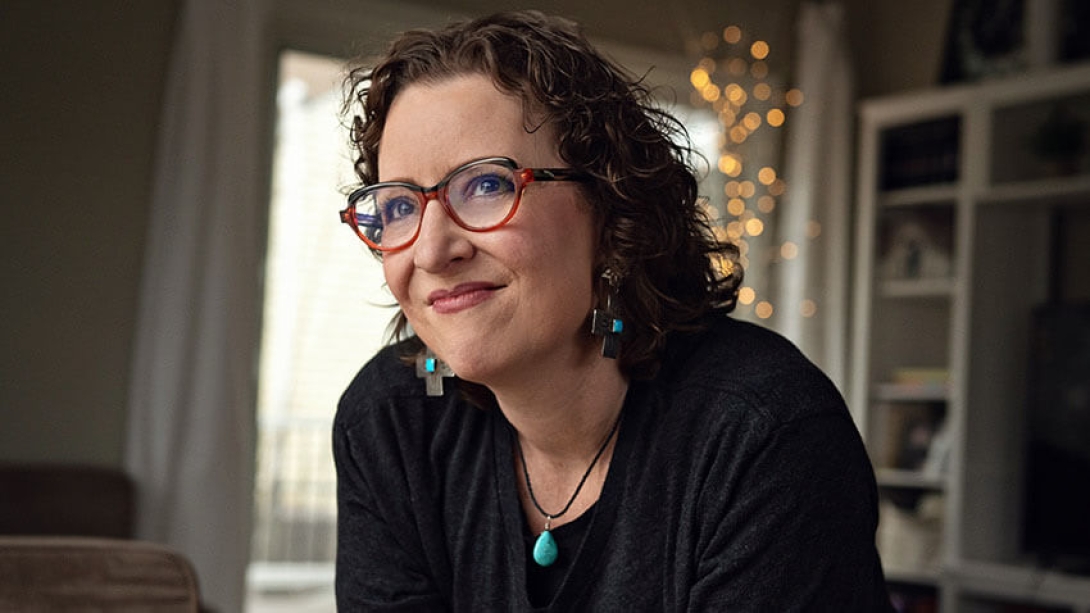Duke, who was profiled in March 2020, reflects on navigating life with stage 4 cancer while much of the country is focused on getting ‘back to normal’.
5:00 AM
Author |

In June, for her 50th birthday, the Rev. Dr. Stacey Simpson Duke, her husband, and their teenage sons gathered with a few other close family friends.
It was a rare treat for the household, even though they're all vaccinated against COVID-19. That's because Duke, co-pastor at the First Baptist Church of Ann Arbor, is living with stage 4 leiomyosarcoma, a rare type of cancer that develops in smooth muscle tissue.
MORE FROM MICHIGAN: Sign up for our weekly newsletter
"People with cancer, especially if they're in active treatment and have compromised immune systems, are at higher risk of getting COVID, and if they do get it, there is a much higher chance it will be quite serious and possibly deadly," she said. "It's tough to have teenagers, too, who are not at the same level of risk, but who have to be just as careful as we did, especially during that first summer while they were seeing their friends out socializing on Instagram."
Duke, who celebrated her fourth anniversary of living with a stage 4-diagnosis in January, said the last year and half have been challenging. She first shared her experiences with the Michigan Health Blog in March 2020. We recently caught up with her for an update.
"There's a public perception or a stereotype that people who are at higher risk, people like cancer patients and the elderly, are people who are kind of already out of circulation anyway — not people who are working and raising kids, which of course is a very false stereotype," Duke said.
If you met her in the grocery store or on the street, there would be nothing to single Duke out as someone living with advanced cancer. Her effervescent personality, Southern charm and scholar's wit all remain undimmed.
"The weird thing about me and my cancer is that I'm pretty much asymptomatic from the cancer itself," Duke said. "It's just the treatments that are the problem."
Navigating the risks of COVID aren't just personal for Duke, they're also professional. She and her church, where her husband Paul is also co-pastor, have been wrestling with when and how to safely return to holding in-person services.
SEE ALSO: The Uncertainty of a Stage 4 Cancer Diagnosis
"We're a public organization, which means we're not just for insiders," Duke said. "We're open to the community, which means we can assume that there are going to be people there whose vaccination status we don't know — and which we're not going to try to confirm. So, our stance as an organization has been that you have to wear a mask if you're inside our building.
"It's ridiculous that the most vulnerable among us are having to carry the burden of risk management," she continued. "Cancer patients and the elderly — and little children now — why should they be the only ones wearing masks because they can't trust who's been vaccinated or not? It's the community's responsibility to band together to protect the most vulnerable among us."

'Manageable toxicities'
While her ministerial work moved from in-person to virtual, Duke also spent much of the pandemic focused on patient advocacy, working both with the Sarcoma Alliance for Research through Collaboration, or SARC, and on an upcoming project for Count Me In, as well as being an active voice in the oncology Twitterverse.
Before PubMed and Google brought each new incremental research advance into patients' homes, the scientific community mainly seemed interested in communicating with itself, she said. But now, more patients like Duke often find themselves trying to keep up with the medical literature in real time — a new audience bent on making the best, most informed decisions they can, but sometimes left feeling that their voices and concerns and lived experiences aren't fully reflected in the conversation.
Like Podcasts? Add the Michigan Medicine News Break on iTunes or anywhere you listen to podcasts.
"If patient-centered care is the ideal, and the research at every stage is driven by scientists without true collaboration with patients or patient advocates, there's a really crucial piece missing," she said.
This is especially true with the development of new cancer drugs, where patients' qualitative experiences of being on the drugs may not feel fully captured by the black-and-white of published data.
"If you're looking at a drug's toxicities, measuring the drop in a patient's hemoglobin count is easy to do objectively," Duke said. "But what about fatigue and pain and nausea and diarrhea? It might depend on what the patient's lifestyle is — is it manageable for someone trying to raise kids or keep a career?"
Duke would like to see more direct feedback from patients included in clinical trial results.
"Some of the best research that I've seen even includes actual patient narratives or patient quotes," she said. "And great, validated quality-of-life assessment tools already exist."
She cheers doctors who are actively trying to bridge this gap, like physician and pancreatic cancer survivor, Mark Lewis, M.D., one of the most visible oncologists on Twitter, who advises other researchers: "Don't use the phrase 'manageable toxicity' unless it's a toxicity you would comfortably 'manage' if it happened to you."
In a 'holding pattern'
Meanwhile, Duke said she has been extremely grateful for the excellent care she has received at Michigan Medicine — from the cancer center's rapid deployment of COVID precautions to her oncologist's and care team's efforts in continuing to manage her disease and explore new treatment options while giving her the best possible quality of life.
"My oncologist, Dr. Rashmi Chugh, and the rest of my care team have been wonderful, and their concern for my well-being is obvious in every interaction I have with them," Duke said. "Living with stage 4 cancer can be such a lonely experience, but their commitment to my care has helped me know I'm not alone.
"They told me from the beginning that they intended to help me live as well as possible for as long as possible, and they are constantly working to help balance the effectiveness of my treatments with quality-of-life issues," Duke added. "Still, the last few months have been a bit of a rollercoaster."
Duke had planned to attend the American Society of Clinical Oncology's annual meeting this summer as a patient advocate — virtually, of course — but treatment complications left her feeling too ill.
Duke has now participated in her third clinical trial, which are challenging to find because of the rarity of her disease. Soft tissue sarcomas make up just 1% of all adult cancers, and leiomyosarcomas comprise just 7-11% of that subset, according to rarediseases.org.
Duke did exceptionally well on her first trial, which involved chemotherapy. It kept her cancer in check for two years from 2018 to 2020. But it was always a question of when the treatment would stop working, not if.
SEE ALSO: Unconditional Love and Radical Acceptance
"It was an extremely tolerable drug for me, and I had minimal side effects," she said.
The chemo, however, quit being effective in October of 2020, and she was shifted to the other arm of the trial, which included another medication. Unfortunately, Duke experienced a severe version of a side effect known as hand-foot syndrome, which made it extremely painful to stand or move. She couldn't drive.
"I felt great, I just couldn't walk," she said.
But side effects aside, the drug didn't work out for her in the end. Then, in April of this year, Duke was able to enroll in a radiation-based clinical trial in Saint Louis.
"I went down four times counting the pre-appointments," she said. "I had three different friends who went with me. It was really nice getting to travel, nice getting to be out of my house, nice being with friends."
Most recently, Duke enrolled in a trial that combines a standard chemotherapy used against sarcoma with a drug that is supposed to help the chemotherapy work longer by targeting a flawed DNA repair mechanism that was implicated in Duke's cancer.
But this time around, the side effects have been more challenging — five different major toxicities, as the language of medical literature would put it.
"I'm not back at square one, but I'm in a holding pattern right now," she said. "It's a very uncertain place. When the pandemic started, I felt like I had this advantage over other people, because I was used to living with uncertainty. And, in some ways, that helped me cope with the pandemic. But I've also discovered that no matter how much experience you have with living with uncertainty, you don't become an expert.
"Or maybe some people do, but I haven't reached that level of enlightenment."
For perspectives from cancer survivors, practical advice on living with cancer and expertise from our leading care professionals, sign up for the Rogel Cancer Center's Thrive newsletter.

Explore a variety of healthcare news & stories by visiting the Health Lab home page for more articles.

Department of Communication at Michigan Medicine
Want top health & research news weekly? Sign up for Health Lab’s newsletters today!





